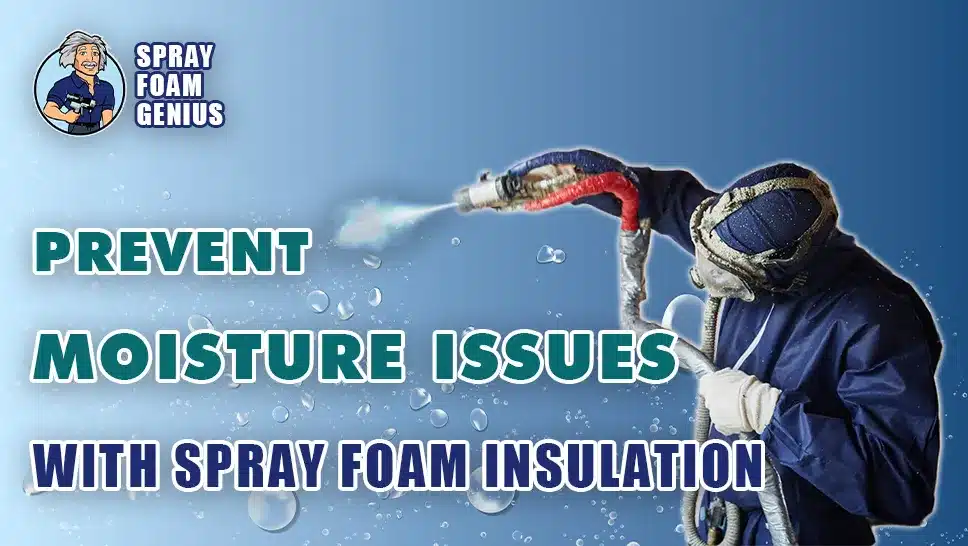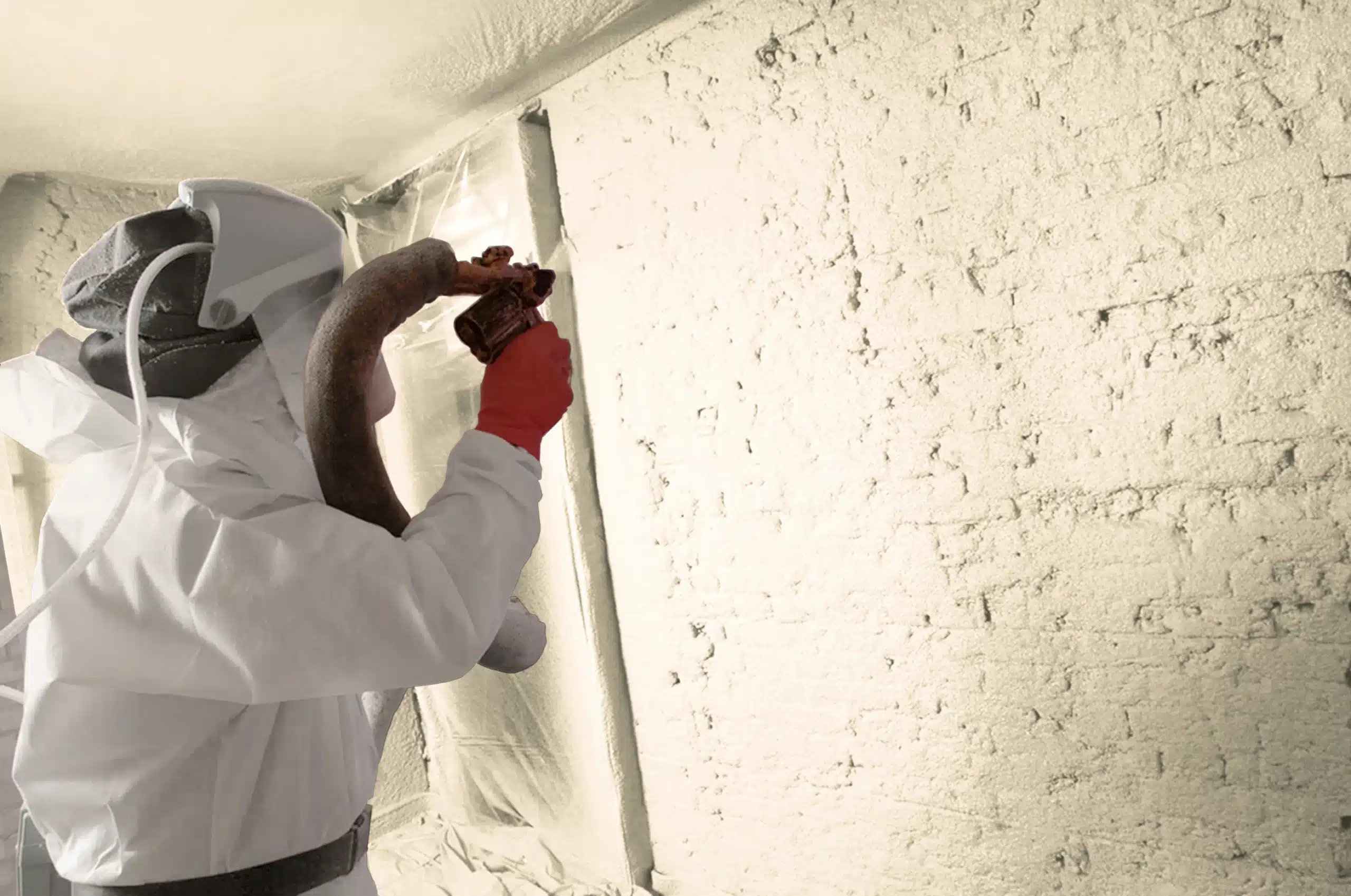
Moisture control is a critical aspect of maintaining a healthy and durable home or business. Excessive moisture can lead to a range of issues, including mold growth, structural damage, and poor indoor air quality. One of the most effective solutions for managing moisture in buildings is spray foam insulation. This versatile material not only provides excellent thermal insulation but also plays a significant role in controlling moisture, helping to protect your property from the damaging effects of water infiltration.
In this blog post, we’ll explore how spray foam insulation helps with moisture control, the science behind its effectiveness, and why it’s an essential investment for homeowners and businesses alike.
The Importance of Moisture Control in Buildings
Moisture is one of the most common and challenging problems in both residential and commercial buildings. It can enter a structure through various means, including:
- Condensation: Warm, humid air can condense on cooler surfaces, leading to water accumulation.
- Water Infiltration: Rainwater, groundwater, or flooding can penetrate through cracks, gaps, or poorly sealed areas in the building envelope.
- Leaks: Plumbing leaks or roof leaks can introduce moisture into walls, ceilings, and floors.
When moisture is not adequately controlled, it can lead to several serious issues:
1. Mold and Mildew Growth
Mold thrives in moist environments, and once it takes hold, it can spread rapidly throughout a building. Mold not only damages building materials but also poses health risks to occupants, including respiratory issues, allergies, and other health problems.
2. Structural Damage
Excessive moisture can weaken building materials such as wood, drywall, and insulation, leading to structural damage over time. This can result in costly repairs and even compromise the safety of the building.
3. Reduced Energy Efficiency
Moisture can reduce the effectiveness of insulation, leading to increased energy costs. When insulation becomes wet, it loses its ability to retain heat, forcing heating and cooling systems to work harder to maintain a comfortable indoor temperature.
4. Poor Indoor Air Quality
High moisture levels can contribute to poor indoor air quality by promoting the growth of mold, dust mites, and other allergens. This can negatively impact the health and comfort of building occupants.
Given these potential problems, it’s clear that effective moisture control is essential for maintaining a healthy, durable, and energy-efficient building. This is where spray foam insulation comes into play.
What is Spray Foam Insulation?
Spray foam insulation is a two-component mixture that expands on contact to create an airtight, insulating barrier. It is applied as a liquid and quickly expands to fill gaps, cracks, and crevices, making it an excellent choice for hard-to-reach areas and irregular surfaces. There are two main types of spray foam insulation:
1. Open Cell Spray Foam
Open-cell spray foam has a lower density and is more flexible. It is typically used in interior applications where soundproofing and cost-effectiveness are priorities. Open cell foam has a sponge-like structure that allows some vapor to pass through, making it breathable but less effective as a moisture barrier.
2. Closed Cell Spray Foam
Closed-cell spray foam is denser and more rigid. It has a higher R-value (a measure of thermal resistance) and is more effective at blocking moisture and air infiltration. Closed-cell foam is often used in exterior applications, basements, crawl spaces, and other areas where moisture control is critical.
How Spray Foam Insulation Controls Moisture
Spray foam insulation is uniquely suited to control moisture in buildings due to its composition and application process. Here’s how it works:
1. Creates an Airtight Seal
One of the primary ways spray foam insulation helps with moisture control is by creating an airtight seal. When applied, spray foam expands to fill every gap, crack, and crevice in the building envelope. This comprehensive coverage prevents air leakage, which is a common pathway for moisture to enter a building. By sealing these entry points, spray foam insulation effectively blocks the infiltration of humid air, reducing the risk of condensation and moisture accumulation.
2. Acts as a Vapor Barrier
Closed-cell spray foam, in particular, acts as an effective vapor barrier. Its dense structure prevents water vapor from passing through, which is crucial for controlling moisture in areas prone to high humidity or water exposure. By acting as both an insulator and a vapor barrier, closed-cell spray foam eliminates the need for additional moisture control measures, simplifying the construction process and providing long-term protection against moisture-related problems.
3. Prevents Water Infiltration
In addition to blocking air and vapor, spray foam insulation can also prevent water infiltration. Closed-cell spray foam is water-resistant, meaning it won’t absorb water like other types of insulation. This makes it an ideal choice for basements, crawl spaces, and exterior walls where water intrusion is a concern. If a building experiences flooding or a leak, closed-cell spray foam will not become saturated, thus preserving its insulating properties and preventing further water damage.
4. Reduces the Risk of Condensation
Condensation occurs when warm, moist air comes into contact with a cooler surface. If this condensation happens within walls, ceilings, or floors, it can lead to moisture buildup and mold growth. Spray foam insulation helps mitigate this risk by maintaining consistent temperatures within the building envelope. By reducing temperature differentials between interior and exterior surfaces, spray foam minimizes the conditions that lead to condensation, thus controlling moisture effectively.
5. Enhances Structural Integrity
Another benefit of closed-cell spray foam insulation is its ability to enhance the structural integrity of a building. When applied, it hardens into a solid, rigid material that can strengthen walls, roofs, and other structural components. This added strength can help protect the building from moisture-related damage, such as wood rot and warping, which can occur when materials are exposed to excessive moisture over time.
6. Long-Term Durability
Spray foam insulation is highly durable and long-lasting. Unlike other types of insulation that may degrade or settle over time, spray foam maintains its shape and effectiveness for decades. This durability ensures that the moisture control benefits provided by spray foam will continue to protect your home or business long into the future, reducing the need for costly repairs and maintenance.
Applications of Spray Foam Insulation for Moisture Control

Spray foam insulation can be used in a variety of applications to control moisture and improve the overall performance of a building. Some of the most common uses include:
1. Basements and Crawl Spaces
These areas are particularly vulnerable to moisture intrusion due to their proximity to the ground. Applying closed-cell spray foam insulation to the walls and floors of basements and crawl spaces can create a moisture barrier that prevents water from entering and causing damage.
2. Exterior Walls
Insulating exterior walls with spray foam helps to protect against rainwater infiltration and reduces the risk of condensation within the wall cavity. This is especially important in climates with significant temperature variations between indoor and outdoor environments.
3. Attics and Roofs
Attics and roofs are prime locations for air leakage and moisture buildup. Spray foam insulation can be applied to the underside of the roof deck to create a continuous air and moisture barrier, preventing condensation and protecting the roof structure from water damage.
4. Interior Walls
In areas of the home where soundproofing is important, such as bedrooms or home offices, open-cell spray foam can be used to control moisture while also reducing noise transmission. This dual-purpose application makes it a popular choice for interior walls.
5. Commercial Buildings
In commercial settings, spray foam insulation is often used to insulate and protect large areas, such as warehouses, manufacturing facilities, and office buildings. Its ability to control moisture and improve energy efficiency makes it a valuable investment for businesses looking to reduce operational costs and protect their assets.
Protect Your Property with Spray Foam Insulation
Moisture control is a crucial aspect of maintaining a safe, healthy, and energy-efficient building. Whether you’re dealing with a damp basement or leaky roof, or simply want to improve the overall performance of your home or business, spray foam insulation offers a reliable and effective solution. Its ability to create an airtight seal, act as a vapor barrier, and prevent water infiltration makes it an invaluable tool in the fight against moisture-related problems.
At Spray Foam Genius Marketing, we specialize in helping spray foam insulation contractors connect with customers who are seeking top-notch insulation solutions. If you’re a contractor looking to expand your business or a homeowner interested in the benefits of spray foam insulation, we’re here to assist you. Our team of experts can guide you through the process, ensuring you get the best possible results for your property.
For more information or to get started, contact us today at 877-840-FOAM for USA and 844-741-FOAM for Canada, visit our website at https://sprayfoamgeniusmarketing.com, or email us at [email protected].
- How to Use Pinterest to Market Your Spray Foam Insulation Services - December 27, 2023
- How to Use LinkedIn to Grow Your Spray Foam Insulation Business - December 23, 2023
- How to Use Instagram to Showcase Your Spray Foam Insulation Projects - December 16, 2023

